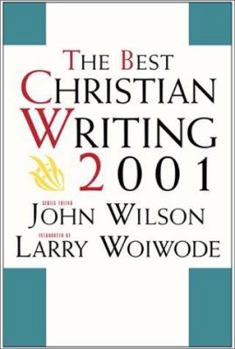The Best Christian Writing 2001 (Best Christian Writing)
Select Format
Select Condition 
Book Overview
In the inaugural volume of this important annual series, editor John Wilson brings together an elegant and engaging array of essays by contemporary Christian luminaries. These distinguished writers... This description may be from another edition of this product.
Format:Paperback
Language:English
ISBN:0060697075
ISBN13:9780060697075
Release Date:October 2001
Publisher:HarperOne
Length:352 Pages
Weight:0.68 lbs.
Dimensions:0.9" x 6.8" x 8.0"
Customer Reviews
5 ratings
mixed bunch
Published by Thriftbooks.com User , 16 years ago
There is no real surprise that this is a mixed bag of pieces. There are some really good ones, some really, really good ones, but there are also a lot of dull or pointless pieces. A lot of it comes across as dry, but hey, it is still worth the price. And it is a debut collection, and these always get better as time goes and the editor and others become more experienced.
Excellent reading
Published by Thriftbooks.com User , 17 years ago
I have not read the entire book. However an interview with Eugene Peterson alone is worth the price of the book.
A Great Set of Essays
Published by Thriftbooks.com User , 18 years ago
A wonderful and personable collection of travel writings from the spiritual journey. I would have given it 5 stars, but I find Richard John Neuhaus a most rigid read and I don't like the patronizing judgments Paul Marshall passed upon Islam. But the rest are fine in every way, especially: Amy Laura Hall on Bioethics, Frederica Mathewes-Green on Crucifixion theology, Bill McKibbon on Church, Lauren Winner on weddings and Daniel Taylor on a most unusual pilgrimage.
A fine selection with some real gems
Published by Thriftbooks.com User , 18 years ago
"The Best Christian Writing 2006" contains twenty selections varying from theology to movie review to travelogue to observation of aged and infirm care to art criticism. My favorites are: - "Phil's Shadow: The Lessons of Groundhog Day" which casts a discerning eye on the Bill Murray film. Author Michael P. Foley convincingly examines the movie beyond the obvious conclusion that it portrays Eastern religious themes such as karma and rebirth to find it is rife with Christian allusions and foundations. This essay is fascinating and fun. - "The Meaning of Christ's Suffering," by Eastern Orthodox convert Frederica Mathewes-Green is a prior-to-seeing-it reflection on Mel Gibson's "The Passion of the Christ." More accurately, it is a finely reasoned argument that lingering on Christ's pain on the cross (as Gibson's movie does) arose seriously only in later medieval times and that before that Christians (even back to the writers of the Gospels) concentrated more on the salvific intention of the crucifixion: Christ as Savior rather than as Victim. Mathewes-Green distinguishes between ideas of Christ as freely offering his death to the Father vs. Christ as payment demanded by the Father. I found this the most important discussion in the book. - "Brother John" which takes us briefly into a Trappist Monastery and shares a glimpse of a man who "loves God so much he doesn't know what to do with himself...so he stands outside on a cold Christmas night with an umbrella waiting...to offer us some protection and human comfort...." Brother John is a vivid reminder of loving, selfless devotion to God and he is not soon set aside. - "Is Art Salvific?" falls more into the category of art criticism than Christian writing, but it manages to consider whether art ought to be completed in the one observing it or in and of itself, as an expression of the numinous or the mundane, and as "the object of engrossed contemplation" or of participation. At one point the author, Nicholas Wolterstorff, writes that a chair in a museum can't "come into its own" because it isn't being used as a chair behind its glass case. But, is it a chair because it is used as one or because we see it as one? And does a hymn "come into its own" because it is sung or because it is heard or only both? Is something "art" when it records the detritus of our lives or when it "puts us in the presence of the Transcendent?" These are questions worth pursuing. To those who pick up a book for ideas, "The Best Christian Writing 2006" doesn't disappoint. But the anthology is wide-ranging enough that readers interested in sociological, ministerial and emotional aspects of Christianity will also be satisfied. Recommended.
A mixed bag, as expected
Published by Thriftbooks.com User , 24 years ago
It's difficult to review an anthology-type book like this because the quality (or, more precisely, the usefulness) of the articles vary greatly. The great majority of the essays included, although interesting, cannot be considered life-changing. But one essay, in my opinion, is worth the price of the book. "Jesus the Logician" by Dallas Willard could change (and enhance) the way one looks at the central figure of Christianity. Expounding on a theme introduced in his brilliant book "The Divine Conspiracy", namely, that Jesus is the most intelligent person who ever lived, Willard explores Jesus' use of rigorous logic, especially when answering the queries of his opponents. Indeed, a logical analysis of Jesus' sayings can be the key to their proper interpretation. To me, this article stands head and shoulders above the others.Other worthwhile essays by other authors include "Wise Teachers, Sound Teaching", "Surprised by Death" and "The Market as God". Other entries, of which "The Recovery of Moral Agency?" is a good example, seem dry and difficult. Everyone will have their favorites in this collection, and normally such a mixed bag would earn this book three stars. But the Dallas Willard article gives this anthology a boost to the next level.






